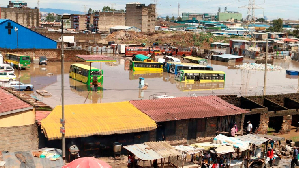- Home - News
- TWI News | TV
- Polls
- Year In Review
- News Archive
- Crime & Punishment
- Politics
- Regional
- Editorial
- Health
- Ghanaians Abroad
- Tabloid
- Africa
- Religion
- Election 2020
- Coronavirus
- News Videos | TV
- Photo Archives
- News Headlines
- Press Release
General News of Wednesday, 2 May 2007
Source: GNA
FAO regional workshop underway in Accra
Accra, May 2, GNA - Mr Daniel Christian Dugan, Deputy Minister of Fisheries on Wednesday appealed to scientists and fishermen to liaise in finding solutions to the post harvest fish loss, which was affecting the entire food production system.
He said post harvest loss was an unacceptable waste of scarce natural resources in an era when there was an alarming rate of depletion of marine and fresh water resources.
"Minimising post harvest losses is therefore one key to increasing wealth creation and food security, without intensifying fishing effort," he told participants at the opening of a workshop on "Regional Post Harvest Fish Loss Assessment Methodologies" in Accra on Wednesday. The workshop organized by the Food and Agriculture Organisation (FAO) attracted about 18 participants from 12 African countries, including Ghana, Nigeria, Cameroon, Chad, Mali, Kenya, Tanzania, Uganda, Malawi, Senegal, Cote d' Ivoire and The Gambia. The workshop aims at helping to reduce post- harvest losses in the participating countries to improve the livelihood and food security conditions of the fisher folk and the large rural population through better utilisation of catches. The six-day meeting would come out with work plans for the respective countries and share information on fish loss assessment methodologies.
Mr Dugan said one of the commonest losses causing worry to the FAO and the Ministry of Fisheries was the discarding of "by-catch" by trawlers.
He said by-catch meant catching of a fish product other than what was intended to be caught. Citing the shrimp trawler as an example, he said reports reaching his office indicated that some Shrimp trawlers discarded as much as 95 per cent of their catch including mackerel, sardines and anchovies which were considered as by-catch.
Mr Dugan said while the artisanal fisheries rarely discarded fish, they did loose a substantial amount of the value of their catch before it could be eaten, due to the hot temperatures in this part of the world.
"With the hot tropical temperature in this part of the world, fish can get spoilt while still in the canoe or boat, at landing or processing, on the way to the market and while waiting to be sold," he said, adding that "such post harvest losses could be as high as 20 to 25 per cent and in some cases at 50 percent".
The Fisheries Minister said that improving storage and processing techniques were a large part of the answer to artisanal fish losses saying that some selected landing beaches had been earmarked for the construction of modern state of art fishing harbours and landing sites equipped with freezers, cold stores, ice making machines and fish markets.
Mr. Dugan sa id the ice making machines would supply ice to fishers to go to sea so that they could store their fish properly until they landed at the shore, whilst the blast freezers would also deep freeze the fish to the required temperature and ready for storage in the cold stores over a long period of time.
"The modern fish market will be designed to meet international standards all in the name of keeping down post harvest losses, he said. He urged the participants to be mindful of the challenges that they would be confronted in their bid to bring innovations into the fishing industries especially, he said. Mr Edouard K. Tapsoba Officer in Charge, FAO Regional Office for Africa said; = "Improvement in post-harvest fish technology will enhance utilisation by converting available low-value resource into products for direct human consumption and therefore contributing to reducing post-harvest losses". Mr Tapsoba said, artisanal fisheries products had an average of 80 percent of the fish consumed in the Africa region and post harvest losses in this sub sector had always been a major concern to FAO. He however said, several techniques had been introduced by FAO to reduce losses through better preservation, processing and storage of fish products
Opinions









